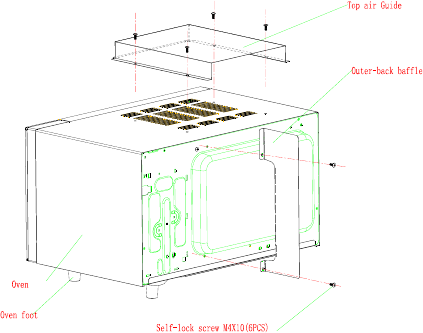
1
OPERATION THEORY OF MICROWAVE OVEN
1. Microwave is a kind of high frequency electromagnetic wave, which is commonly distributed in the
nature. But the existing form of microwave is dispersed so that it cannot be collected together for heating
purpose. The key component of magnetron of microwave oven will transform the energy of electricity to
microwave and huge energy of microwave field is established under the closed cavity. So the molecule of
food is caused to vibrate at very high speed and the friction heat produced will cook the food in a fast
way.
2. There is 3 properties of microwave, that is
a) Absorbability: the microwave can cause the excess vibration of molecule of various food so as to obtain
the heating purpose. But the infiltration ability is largely depend on the size, thickness and properties of
the food.
b) Penetrability: microwave can penetrate through ceramics, glass, temperature-resistant plastics. It is
required
to use the containers whose material have good microwave penetrability to achieve best heating
result. See the below utensils guide.
c) Reflectivity: microwave would be reflected by the metal wall of interior cavity so as to establish an
even magnetic field, thus can prevent the overheating of partial area.
INSTALLATION OF MICROWAVE OVEN
1) The position of the oven shall be such that it is far from the TV, Radio or antenna as picture disturbance
or noise may occur.
2) The appliance must be positioned so that the plug is accessible.
3) This is a cabinet microwave oven,which is subject to PRECAUTIONS and INSTALLATION below .
① RECAUTIONS:
To ensure THIS microwave oven against a poor ventilation work, fires as well as an undue life, a possible
cabinet shall follow:
a) Intake and exhaust port on back surface, as shown in Fig.4.
b) Net depth≥550mm, as shown in Fig.3.
c) Reference plate thickness between 18 and 20mm.
② INSTALLATION:
a) Secure top air guide onto housing while outer-back baffle onto outer-back plate with self-lock
screws,as shown in Fig.1.
Fig.1.
b) Secure holders onto each side housing with self-lock screws,as shown in Fig.2


















